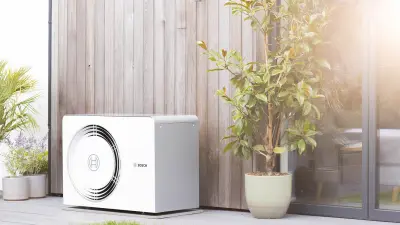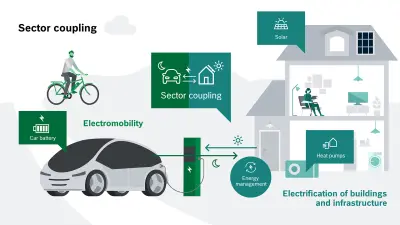Climate protection in buildings: Clean electricity instead of fossil fuels
Heat pumps and stationary fuel cells as well as intelligent energy management and sector coupling reduce emissions and costs.

Heatwaves, droughts, rising sea levels — climate change is threatening our world more and more each year. Politicians, society and business are all confronted with the problem and must act. At Bosch, we are rising to the challenge and developing innovations to ensure a life worth living for everyone in the future. Electrification plays an important part here as it enables us to become independent of oil, gas and coal for mobility and our energy supply.
Buildings too are significant when it comes to climate protection: around 30 percent of Germany's greenhouse gas emissions can be attributed to their operation, especially heating. This is one good reason for Bosch Home Comfort and Bosch Building Solutions to place particular emphasis on the supply of heat to buildings — with the aim of reducing energy consumption. Bosch Research is laying the foundations for this. Our researchers come up with innovations for a sustainable, electricity-based energy supply for buildings. The three pillars of our research are heat pumps for environmentally friendly heating, solid oxide fuel cells (SOFCs) and needs-based energy management.
Heat pumps for an energy revolution in boiler rooms
Heat pumps are a key technology when it comes to operating buildings sustainably — the systems are much more environmentally friendly and efficient than fossil-fuel boilers. If they are operated using green electricity, they are even CO₂ neutral. As an experienced manufacturer of heat pumps for residential buildings, Bosch Home Comfort is well equipped to cope with rapidly increasing demand. The company has a major advantage over its rivals: rather than simply providing heat pumps, it supplies complete systems including components such as heat accumulators and control units for integrating the heating system into a house’s energy management system. This combination of components can significantly reduce the energy consumption of houses. Bosch Research provides support here in a variety of ways — for example with its digital expertise acquired through mathematical simulations and model-based research for product development and tests. At the same time, we research “more intelligent” heat pump systems with the help of virtual development and control as well as machine learning. Thanks to more compact cooling circuits, heat pumps can also be used in buildings where space is limited. This directly benefits customers and the environment. At Bosch Research, we are helping to make heat pumps even more efficient so that they require less electricity. This reduces costs and emissions.
Green electricity with SOFC fuel cells

Solid oxide fuel cells (SOFCs) are another area of research at Bosch Research. This environmentally friendly technology is particularly suitable for supplying energy to quarters and larger buildings, such as city quarters, industrial plants and data centers. After all, the fuel cells provide electricity and heat at the same time, and they can run on natural gas, biomethane, and hydrogen (blends). They are powered by hydrogen produced via electrolysis — another key area of research at Bosch Research. Wind or solar power is used in the process. By being used in fuel cells, the hydrogen acts as a “storage facility” for green electricity.
Electrical infrastructure: Connecting electrified mobility and the energy supply for buildings
The electrification of mobility and buildings also allows previously separate systems to be coupled together. With this so-called sector coupling, the experts at Bosch Research are aiming to connect the energy supply for buildings through intelligent solutions for bidirectional charging. For example, electric cars can be used as energy storage facilities for the electricity supply in buildings. In this case, the stored electricity comes from a photovoltaic system and is used to charge the vehicle’s battery during the day. If the sun is not shining, e.g. in the event of bad weather or at night, the electricity is fed into the building to supply power and generate heat. This process is called “Vehicle to Home” (V2H), i.e. feeding electricity back into the grid.

Protecting the climate and reducing costs with needs-based energy management
For end users, there is an increasing need to use electrical generators, loads and storage systems intelligently and thus to make operation as energy and cost-efficient as possible. This means for example that self-generated photovoltaic (PV) electricity can be used optimally. As a provider of energy efficiency and energy management solutions, Bosch stands out here as we are a leader when it comes to home automation, charging solutions, heat pumps and household appliances. At Bosch Research, we are helping to develop the energy management systems of the future by analyzing suitable needs scenarios. We develop intelligent algorithms for controlling and regulating energy flows in a building and between the building and vehicles.
Bosch Research is also helping to make the most of the potential of digitalization for climate protection in the building sector: for example in energy management, where the aim is to control energy flows in such a way that CO₂ emissions and costs are minimized. This includes smart charging solutions which connect power generation, charging points and vehicle electronics. Both fleet operators and private households benefit from such innovations in the field of electrical infrastructure.

